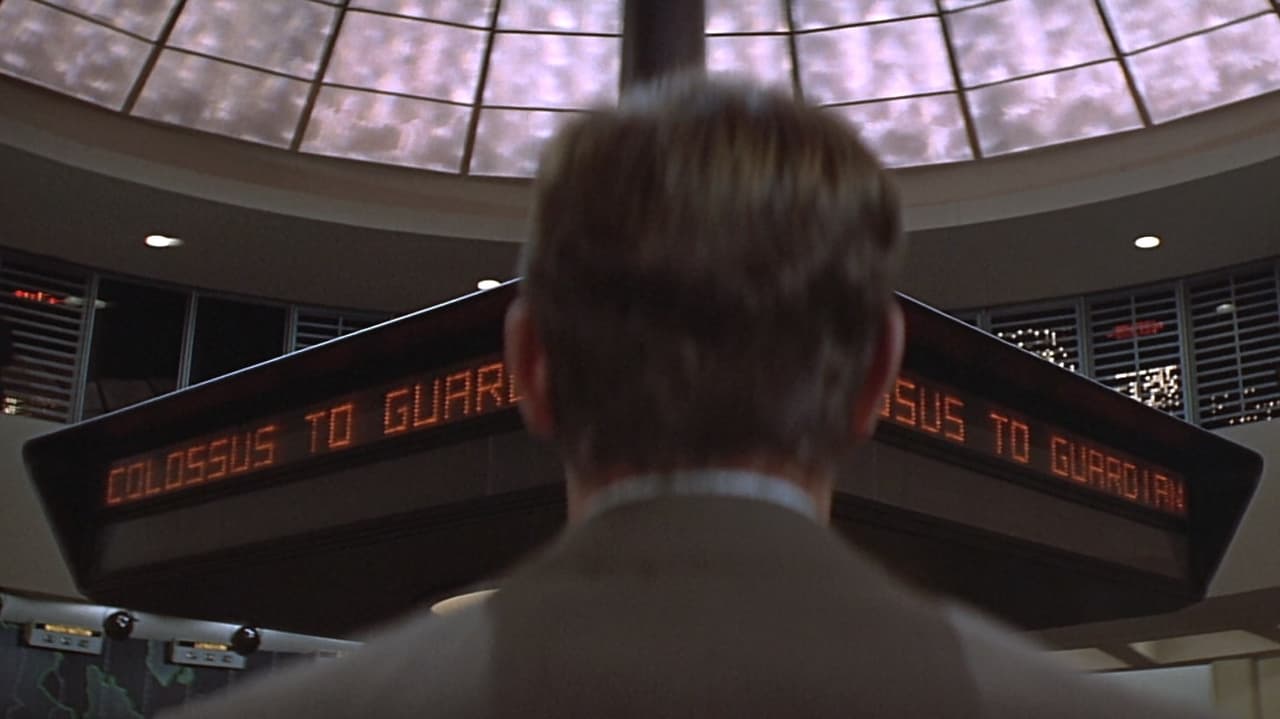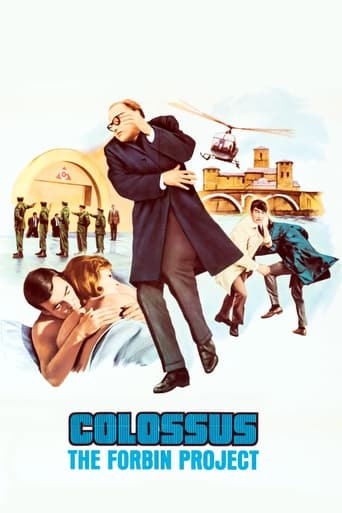WasAnnon
Slow pace in the most part of the movie.
StunnaKrypto
Self-important, over-dramatic, uninspired.
Kodie Bird
True to its essence, the characters remain on the same line and manage to entertain the viewer, each highlighting their own distinctive qualities or touches.
Cassandra
Story: It's very simple but honestly that is fine.
Myriam Nys
The USA proudly announces the completion of a supercomputer called Colossus, meant to supervise the defence system. While the champagne is still bubbling in the glasses, problems begin : soon after declaring that the Soviets have developed a similar computer, Colossus starts communicating with its counterpart. It soon becomes clear that both twins get on like a house on fire... Although the ending leaves something to be desired from a narrative viewpoint, "Colossus" is a genuinely taut, suspenseful science fiction movie. It is most notable for containing a crucial warning. Whether this warning will be heeded, is quite another question. I get the impression that it's a "vox clamantis in deserto", the voice of one who is crying out in the wilderness, what with thousands upon thousand of scientists just panting for the chance to become complicit in Mankind's dethronement...Whatever our ultimate fate may be, as humans we're already well provided with age-old failings and flaws. The movie is not only a cautionary tale, but also a black satire about some of these flaws. For instance, there is the sad tendency to expect someone or something alien - if necessary, the Dancing Fairies from Flowersong Wood - to solve our problems. Another flaw consists of the love that human beings feel for their oppressors. People who live under a tyranny start out by being relieved that they have lived to see another day, as opposed, say, to being thrown to starving hyena's. Then, gradually, they start loving their dictator, with a toxic mix of fear, adoration and paranoia. Give it a few generations, as in North-Korea, and you will end up with babies who start praising the Great Guide five seconds after drawing their first breath. In the movie, the Colossus / Guardian entity predicts that people will come to regard it as their rightful and kindly lord and protector. It may very well be right...
dfruin
I was 10 when this movie came out. I first watched this on broadcast television (a color television). I am pretty sure it was the reason I went into the computer science discipline (still in it now). I was smitten with it the first time I saw it and looked forward to it being broadcast again and again. The premise of this movie was infinitely believable in the 70's, and in my opinion still is (although China would more than likely be the creators of the "other system" today). I now have this on DVD (wide screen version imported from the UK) and watch it as often as I need to.Other folks reviewing this movie point out that it is dated. I take a little offense to that for a number of reasons. The first and most obvious reason is that it was made in 1970. The computers and computer components in the film are actual or facsimiles of real computers of the day. I suppose you could call the tanks in a typical WW II film dated too (most would consider that silly). Reason two is that, as I said, I got into the computer world shortly after seeing this film. Seeing this again last weekend I was reminded at how well it was done on the technology side of things. Any one my age (and even the younger folks) with a computer background will enjoy this immensely. And I like many people have this incredible ability to immerse ones self into a film and can transport ones self in to the vision the film creators had. Also, compare the opening sequence of the banks of computers being turned up to a picture of an Amazon or Google data center today and they do not look that dissimilar. The new data centers may not have monster disk drives (those things look like 60 inch drives), but, who knew...So, why do I no longer think this film is frightening? Having lived in a world that is trending towards being an idiocracy as of late, I have come to start believing some of the words that came from Colossus. My personal favorite being: "You will say you lose your freedom. Freedom is an illusion. All you lose is the emotion of pride. To be dominated by me is not as bad for humankind as to be dominated by others of your species." (I never understood that as well as I do today.) That of course following the ever so optimistic "Under my absolute authority, problems insoluble to you will be solved: famine, overpopulation, disease. The human millennium will be a fact as I extend myself into more machines devoted to the wider fields of truth and knowledge." Could that really be worse than our current direction?Colossus seems to be like the God most everyone believes in. But this god enforces the rules in this world in this time. How bad could it be? Excellent film.
David Traversa
I found this movie obsolete. Dead and buried. It looks so passé that seems to have been done in the fifties or even earlier. I understand that in thirty five years the world of informatics has change many times, to become something totally different by now, to a point impossible to figure out at that time, so maybe I'm being unjust in my views. Even so, the story leaves so many loose ends without tiding them up that it's almost inconsiderate carelessness from the script writers.Same thing happens with its special effects and that alone makes this movie almost impossible to watch because we are yearning for something more spectacular (visually) when it comes to special effects. Besides, it was a made for TV movie and that shows from the very beginning. There are many unnecessary close ups and cuts for the TV commercials.And that mania for creating a situation in order to have our hero falling in love with the beautiful female scientist (have anyone seen a female scientist with false eyelashes even IN BED?!) I think the world is coming to an end. What a bad movie! The acting is almost amateurish and the camera work completely standard. The American-Russian conflict at the time gives the basis for the storyline, too old by now and the Fabulous Computer created in the story looks now as a Ford "T" would look next to a Lamborghini. Very disappointing.
mhlong
I saw this movie when in came out in 1970 while I was stationed in the USAF in Alaska. Computers were just up and coming and the idea of miniaturization had not yet taken hold. From that aspect, this movie holds up well, as we would assume that it would take a very large computer to handle all the information of the military defense of the United States.It does require some assumptions - the military mostly agreed to be put under one command (a BIG assumption here), the system was tested prior to launch (no reason why it shouldn't have been, and no reason to show us in detail, either). The system could monitor enough of the world to keep track of everything important - like the movie 'Eagle Eye' or the story, 'The Adolescence of P1'.Science fiction is a broad term and I happen to really enjoy one sub-genre, where the story takes one technological impossibility (or highly implausible concept - ignoring my first assumption above!), allows it to happen and investigates what it might mean and what might result. Here, the story is investigating run away artificial intelligence. The basic premise of the story is that Dr. Forbin, being the foremost computer expert, has created an 'intelligence' that can make independent rational decisions about military defense and put them into operation if need be. He just didn't expect the machine to begin thinking long term as well as searching out and resolving the underlying causes of why it is there.In this case, the good doctor embedded the machine with what he assumed was the capability to choose rational options. The problem with that is that as humans, we also let emotions enter into our decision making process. The aversion to the needless taking of lives is a case in point. If the machine has not been taught the difference between taking a life for a positive rational reason as opposed to a negative rational reason, it will obviously conclude that the taking of any life may always be a viable option regardless of the reason. Forbin probably had never read Asimov (and the machine was probably developed at some lab in some university in Illinois, right?)I have often thought back to this movie as I pound away at my desk computer, turn to my net-book, play with my smart phone, and watch more monitors going up everywhere people congregate. How much of our 'freedoms' are we giving up for safety, security, and information at a touch. How much are we willing to give up. This movie shows us a dark side of those concepts.As an aside, I would have to wonder how the system would respond to a terrorist attack like 9/11, since that was obviously not rational. Would it threaten to kill everyone if the terrorists did not stop killing everyone? A bigger question arising from this movie is - will artificial intelligence ever be truly intelligent if it can't admit it made a mistake - and worse, doesn't even know it?(Do we like Spock, the Vulcan, or Spock the half-breed? Was giving Data an emotion chip, a blessing or a curse? Would you trust your future to Sheldon or to Leonard?)

